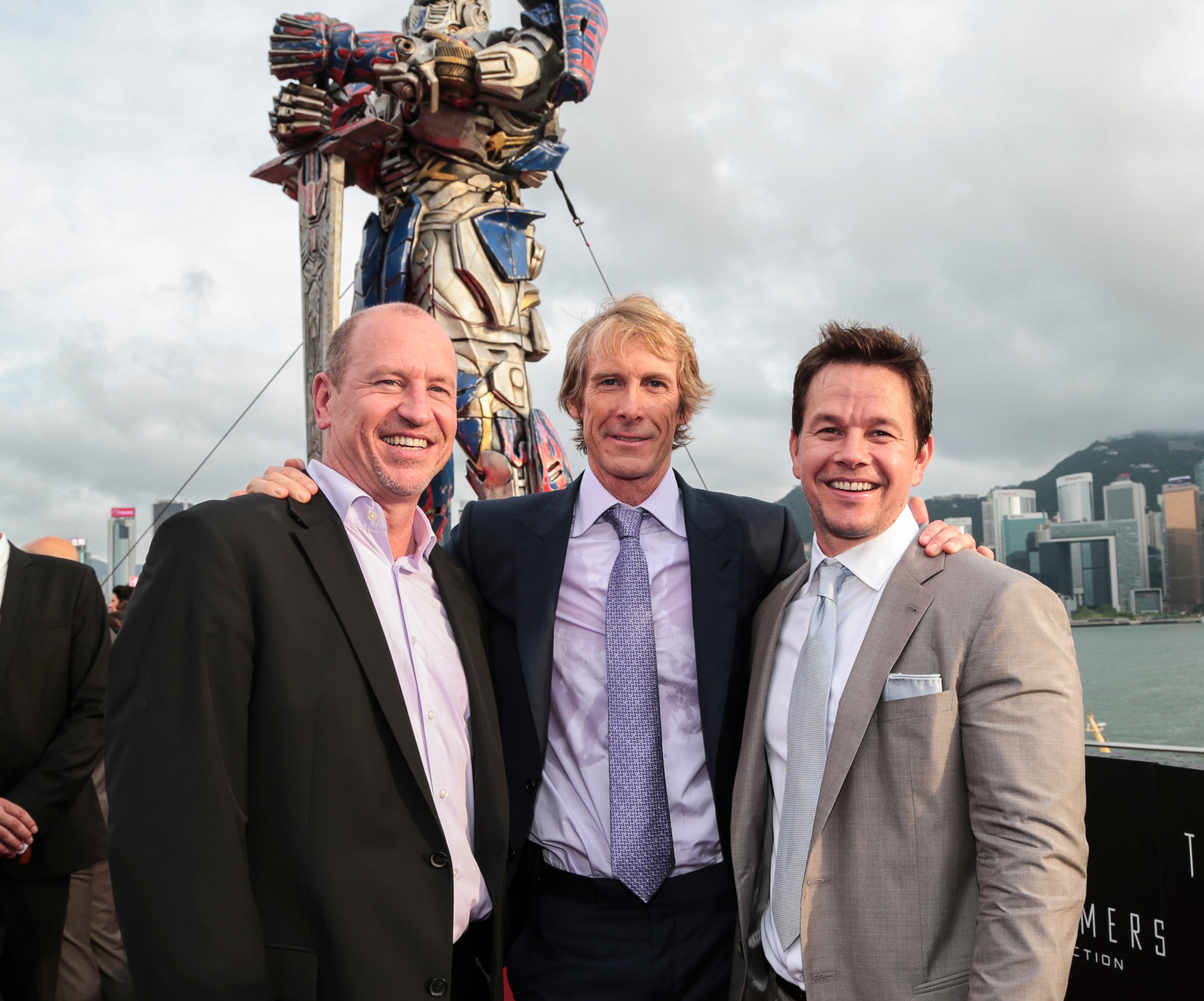
On Thursday night, the latest installment in the Transformers film series had its world premiere in Hong Kong — a city where, eight months ago, director Michael Bay was blackmailed for thousands of dollars and later assaulted with an air-conditioning unit while working on the movie.
No hard feelings, though.
“The background,” Bay told TIME, when asked what struck him most about the city, gesturing at the skyline of Hong Kong Island from the red carpet. “And the people. The people are great.”
The film’s crew and cast (which includes Mark Wahlberg, Stanley Tucci and Kelsey Grammer, all of whom were present for the premiere) first traveled to Hong Kong and mainland China for a few weeks last fall to film Transformers: Age of Extinction. It’s the fourth film in Bay’s billion-dollar franchise, and an effort to appeal to — and capitalize on — China’s burgeoning cinema audience. The series has already enjoyed unprecedented success in the country. Its third film set national box-office records when it opened in the summer of 2011 — ultimately grossing $163 million, the highest of any market outside North America.
In short, Bay, not shy of a little opportunism, saw a smart chance and jumped on it. When Paramount Pictures announced last April that the movie would be filmed and produced in China, its filmmakers stressed that it would not merely treat the country as a scenic backdrop, but rather rely on it as a guiding component of the story — making it even more palatable, maybe, for a Chinese audience.
“The film has a great deal to do with China. Effectively, China is a character in it,” Marc Ganis, president of Jiaflix Enterprises, a Hollywood-based company that distributes Western media in China, said in a statement last spring.
At that point, well-known Chinese actress Li Bingbing had already signed onto the film’s cast; pop star Han Geng, whom Bay described as “one of the most influential entertainers in China,” would follow suit in July. A state-broadcast reality show that aired in September chose four Chinese actors (out of a contestant pool of 70,000) to fill smaller roles.
All things considered, Bay’s shift in attention across the Pacific makes sense. China’s $3.6 billion box-office market is the world’s second biggest — larger than India’s and the U.K.’s combined — and is expected to surpass the U.S.’s by the end of the decade. While ticket sales languished in North America last year, China’s enjoyed a 27% jump. It is a country where an average of 13 new cinemas are built every day.
It should be said here that the popularity of the franchise in China, and Bay’s success there as a filmmaker, is something of an exception to the current rule. Only 34 foreign films each year earn distribution rights from the Chinese government; any picture beyond that quota that plays in China will earn a relatively meager stipend — a few hundred thousand dollars — and no revenue from ticket sales. There’s also the issue of strict censorship: Django Unchained was pulled from Chinese cinemas just “minutes” into its first screening because of on-screen nudity, according to the Telegraph. And anything politically subversive is, of course, off the table.
In a sense, Bay hacked the system. To ensure that the latest Transformers movie would play in China without any hassle, Paramount signed a “cooperation agreement” with both Jiaflix and the state-controlled China Movie Channel, agreeing to produce the film in the country, thereby earning the State Administration of Radio, Film, and Television’s necessary support, and in turn get a release date for the film. Under the deal, Jiaflix, which is essentially China’s Netflix, will also stream more than 250 Paramount films to subscribers.
The in-country arrangement, according to a report by Quartz, will double what Transformers: Age of Extinction would have earned otherwise.
Perhaps that’s why in spite of all the grief and bruises he suffered while filming in Hong Kong last October, Bay seemed so enthused to be back for the premiere, grinning for photographers as he made his way down the red carpet. Seemingly oblivious to the oppressive humidity, and the thunderstorm that followed, his cast appeared to share his sentiments, at least while mugging for the press.
“This is such an amazing city, I just hope to come back and see more of it,” Wahlberg told TIME. “When I was here, I was working the whole time and didn’t get to see much.”
If the thousands-deep mob flanking the red carpet outside the Hong Kong Cultural Center on Thursday night is anything to go by, he’ll be welcome here anytime. Crowds of local teenagers, many still dressed in their school uniforms, struggled to push their way to the velvet rope separating them from the cast, whose pictures they snapped and praises they screamed.
“I used to see these actors on TV, and now I get to see them live,” C.J. Padua, a 15-year-old from Hong Kong, said while waiting for the red-carpet ceremony to begin.
He and his friend Nickson Kanthan, 16, debated the merits of the various Transformers films. Though they agreed that the third movie, the one that set Chinese box-office records, would be difficult to trump, they were biased toward the latest installment. “We almost have to love it because it’s set here,” Padua said. If Hollywood has played its cards right, plenty more blockbusters will be too.
More Must-Reads From TIME
- The 100 Most Influential People of 2024
- How Far Trump Would Go
- Why Maternity Care Is Underpaid
- Scenes From Pro-Palestinian Encampments Across U.S. Universities
- Saving Seconds Is Better Than Hours
- Why Your Breakfast Should Start with a Vegetable
- Welcome to the Golden Age of Ryan Gosling
- Want Weekly Recs on What to Watch, Read, and More? Sign Up for Worth Your Time
Contact us at letters@time.com